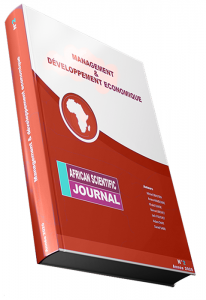L’intelligence artificielle au cœur de l’ingénierie financière : nouvelles mutations des entreprises fintechs sur les marchés financiers
DOI :
https://doi.org/10.5281/zenodo.16099009Résumé
Résumé
Les innovations technologiques ne cessent de redéfinir l’économie mondiale. Dans cet environnement hautement dynamique, les entreprises fintechs doivent se doter d’une forte résilience et rigueur et faire preuve d’un bon niveau de management entrepreneurial pour assurer leur pérennité. Cette recherche interroge la manière dont l’intelligence artificielle (IA) agit comme vecteur de convergence entre l’ingénierie financière et le management entrepreneurial. À partir d’une approche qualitative multi-cas, nous analysons trois types d’entreprises fintech opérant dans des contextes organisationnels et géographiques contrastés : Goldman Sachs (multinationale), Robinhood (startup occidentale) et Flutterwave (fintech africaine). L’étude mobilise une double méthodologie stratégique SWOT et TOWS, fondée sur des données secondaires consolidées. Les résultats montrent que l’intelligence artificielle s’impose comme un levier clé d’hybridation entre contrôle financier et agilité entrepreneuriale. Cette convergence se manifeste différemment selon le type d’entreprise. Elle améliore l’efficacité des multinationales, stimule l’innovation rapide chez les startups, et aide les fintechs africaines à surmonter des défis locaux.
Mots clés : Intelligence artificielle, marchés financiers, ingénierie financière, management entrepreneurial, fintech.
Abstract
Technological innovations continue to redefine the global economy. In this highly dynamic environment, fintech companies must demonstrate strong resilience and rigor, along with a good level of entrepreneurial management to ensure their long-term sustainability. This paper questions how artificial intelligence (AI) acts as a vector of convergence between financial engineering and entrepreneurial management. Utilizing a multi-case qualitative approach, we analyze three types of fintech companies operating in contrasting organizational and geographical contexts: Goldman Sachs (multinational), Robinhood (Western startup), and Flutterwave (African fintech). The study engages a dual strategic methodology of SWOT and TOWS based on consolidated secondary data. The findings indicate that artificial intelligence emerges as a crucial hybridization instrument between financial control and entrepreneurial agility. This convergence occurs differently depending on the type of company. It improves the efficiency of multinationals, stimulates rapid innovation in startups, and paves the way to African fintechs for overcoming local challenges.
Keywords : Artificial intelligence, financial markets, financial engineering, entrepreneurial management, fintech.
Téléchargements
Publiée
Comment citer
Numéro
Rubrique
Licence
(c) Tous droits réservés African Scientific Journal 2025

Ce travail est disponible sous licence Creative Commons Attribution - Pas d'Utilisation Commerciale - Pas de Modification 4.0 International.





















